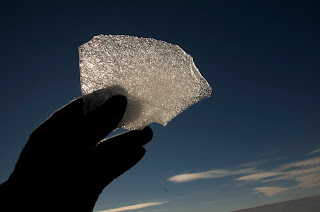Review of Ian Plimer's 'How to get expelled from school'
Scientists have to explain their work to the public; to inspire, to enthuse; to show the relevance of what they do. In a time of austerity, it is no longer good enough to take the public money, keep busy, out of sight, and hopefully out of mind. Scientists largely communicate with one another through journals few people can afford or understand. As a result, efforts to provide a context for the public and explain the science contained within specialised research articles would normally be applauded. Sadly this is not the case with ‘How to get expelled from school’.
 |
| Trapped gas bubbles in Antarctic ice |
With the declaration on the back of the book that the author is ‘Australia’s best known geologist’, hopes might be considered high that this would be a balanced, well-researched piece of work, showing how the past can inform on how our planet works. Unfortunately, the past is referred to throughout the book but badly. If I were in a less charitable mindset I would suggest the author has learnt lessons from the creationists and applied the same cherry-picking approach to climate change. The best I can write is the author doesn’t seem to understand much of the past at all; it’s almost as if the book has been ghost written. Changes in the past seem to be assumed to have happened globally and that to disprove anthropogenic warming, it is necessary to show how carbon dioxide wasn’t the principle cause. The number of misleading statements are far too numerous to be listed here but consider just one example, made on page 174: ‘Some 12,700 years ago, temperatures fell quickly by 8˚C and a 1,300-year cold period, the Younger Dryas began. After this 1,300 year period of intense cold, global temperatures rose very rapidly by about 12˚C marking the end of the Younger Dryas and the end of the latest glaciation. Did this glaciation end rapidly because we sinful humans suddenly put carbon dioxide into the atmosphere? Of course not, there was no industry and no agriculture than and again the hypothesis is wrong.’ Where to start? The Younger Dryas was a marked climatic downturn but it was centred on the North Atlantic region and perhaps across large parts of the Northern Hemisphere but it was not global. It’s been known since the late-nineties that Antarctica was warming up at exactly the same time it was cold during the Younger Dryas in the north. Research over the last few years has shown that warming in the south extends across most of the mid-latitudes of the southern hemisphere, and could have been used to illustrate how we can gain tremendous insights into the climate system from investigating past change. Plimer instead seems to be using the climate signal preserved in Greenland as a record of our planet’s climate and then misleadingly argues the temperature increase at the end of the Younger Dryas in the high latitudes was global. The cause wasn’t carbon dioxide, true, it was most probably linked to changes in the ocean circulation system, but this doesn’t mean increasing greenhouse gas levels in the atmosphere isn’t a problem for the future.
Research published last year in the prestigious journal Science (and before ‘How to get expelled from school’) has shown that without carbon dioxide, global temperatures would soon fall to an average of -21˚C. Fortunately the atmosphere does contain carbon dioxide and as a result we enjoy a relatively balmy 15˚C today. By flooding the atmosphere with carbon you would expect temperatures to increase. After all, science is built on the premise of Ockham’s razor, namely the simplest explanation is invariably the correct one. Ultimately, we've been here before with the young Earth brigade. To paraphrase Plimer from earlier work, all the 'sceptical' view of climate change science has to do is prove the fundamental principle that increasing greenhouse gases in the atmosphere will increase temperature is wrong. A Nobel Prize and instant fame would be the reward for the first scientist – or politician – who could not only explain away future climate change but at the same time expound thermodynamics, energy transfer, infrared absorption etc in a totally different way to that understood by science and used by civilization for centuries. I wish them the very best of luck.


Comments
Post a Comment